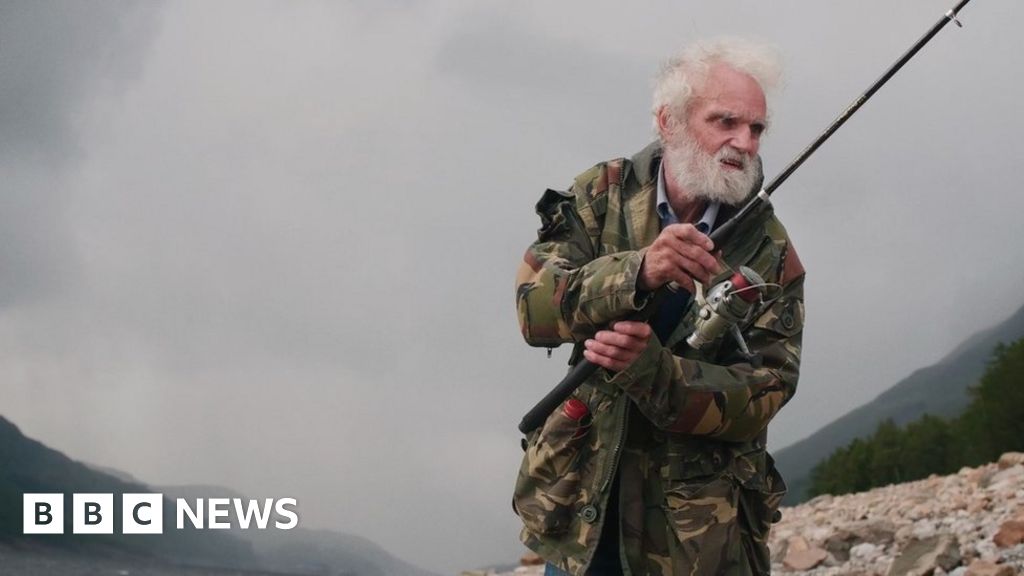The BBC Scotland news website has looked back at our most-read stories of the year. This is the top 20 for 2021, with the ranking based on the number of page views.

1. Election win for SNP
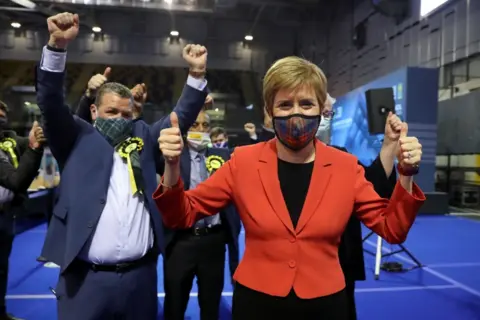 Reuters
ReutersThe Scottish Parliament election on 6 May resulted in the SNP taking 64 of the 129 seats, just one short of an overall majority at Holyrood.
There was no overnight count because of Covid restrictions and the outcome took much longer than usual, with the final results from Thursday’s voting not being declared until late on Saturday.

2. Kilmarnock attacks
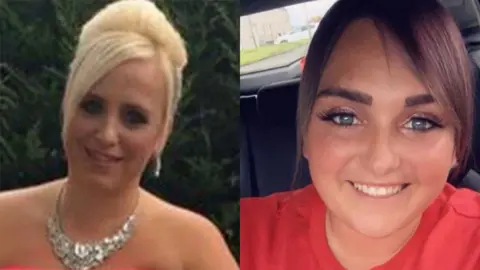 Facebook
FacebookOn a Thursday evening in February, news emerged of two shocking attacks in Kilmarnock in which a mother and daughter were killed.
Emma Robertson Coupland, 39, died after she was found injured in the car park of Crosshouse hospital and about 20 minutes later her daughter, Nicole Anderson, 24, was fatally stabbed two miles away.
Mrs Coupland’s ex-husband, Steven Robertson, died after fleeing the scene and crashing his car into a tree.

3. New lockdown
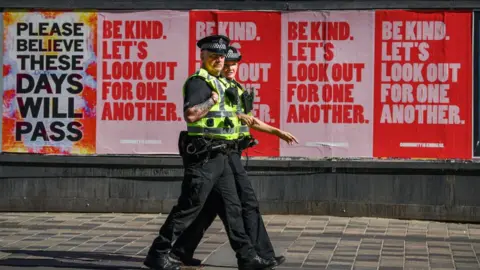 Getty Images
Getty ImagesThe Covid pandemic has dominated the year and many of the biggest stories relate to its twists and turns.
The most-read of them all was at the very start of 2021 when Scotland went back into lockdown because of a new variant that was rapidly spreading throughout the country.
All schools were told to close until at least the end of the month, people were required to stay at home and work from home where possible and outdoor gatherings were cut back, with people only allowed to meet one person from one other household.
Places of worship were closed and group exercise banned.

4. The hermit
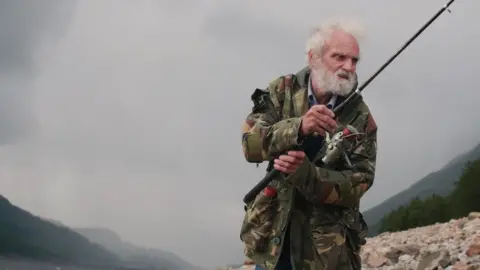 Uruna Productions
Uruna ProductionsIn November, BBC Scotland broadcast a documentary on a man who had lived as a hermit for 40 years.
Ken Smith shunned conventional life and lived without electricity or running water in a hand-made log cabin on the banks of a remote loch in the Scottish Highlands.
“It’s a nice life,” said Ken. “Everybody wishes they could do it but nobody ever does.”

5. The Brazilian variant
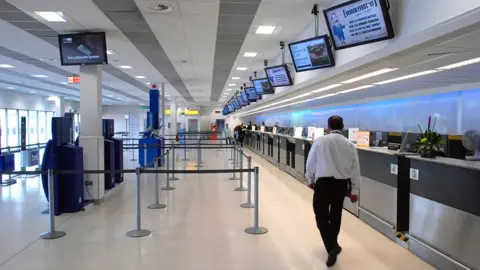 AFP
AFPWay back at the start of March, as the Kent variant of Covid (now known as Alpha) started to pass its peak there was briefly a very strong concern that the next threat was emerging in Brazil.
An enhanced contact tracing effort began after three oil workers flying into Aberdeen from Brazil tested positive for the new strain.
The Brazilian variant went on to be renamed Gamma and it spread to more than 10 other countries, including the UK.
It never became the dominant variant in the way that Alpha, Delta and now Omicron did.

6. Eliminating Covid
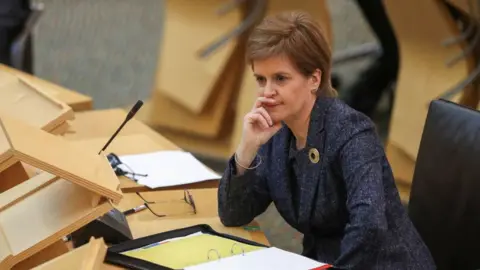 Getty Images
Getty ImagesAlso in early March, First Minister Nicola Sturgeon said Scotland’s objective must be “to eliminate” coronavirus.
She told Holyrood’s Covid-19 committee that striving to get new case numbers as low as possible was the only way to keep it under control.
Ms Sturgeon said “the virus won’t play ball” with any effort to maintain case numbers at a “medium level”.
She was speaking as the Scottish government was easing some lockdown restrictions, which had been in place since the start of January, although the stay at home order remained.

7. The route out of lockdown
 Getty Images
Getty ImagesGetting into the second lockdown at the beginning of January was simple but getting out of it was a different matter all together.
She said the aim was to move fully back to a levels system of restrictions from the last week in April, with the country’s stay-at-home restrictions lifted on 5 April.

8. Loch Lomond deaths
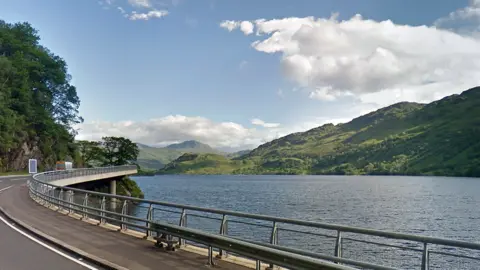 Google
GoogleIn July, a man, woman and a boy died after getting into difficulty in Loch Lomond.
They were among six water deaths in Scotland on the same weekend.
They were later named as Edina Olahova, 29, her son, Rana Haris Ali, and family friend, 39-year-old Muhammad Asim Riaz.

9. Schools stay closed
 Getty Images
Getty ImagesWhen the lockdown was announced at the beginning of January, it was initially for a period of three weeks.
On 19 January, First Minister Nicola Sturgeon announced that this would be extended until at least the middle of February.
She said transmission of the Covid virus appeared to be declining but was still too high to ease restrictions.
Ms Sturgeon hoped schools would be able to begin a phased return to the classroom in the middle of February.

10. The Salmond inquiry
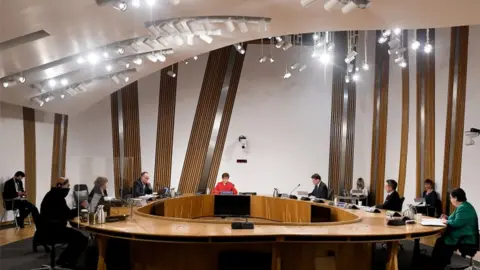 Reuters
ReutersThe long-running inquiry into the Scottish government’s botched handling of sexual harassment complaints made against former First Minister Alex Salmond by two female civil servants came to a conclusion at the start of March.
Firstly Mr Salmond used his all-day evidence session to accuse his former protégé, Nicola Sturgeon, of repeatedly misleading parliament.
Then Ms Sturgeon herself spent eight hours being questioned by MSPs.
The BBC’s Nick Eardley wrote: “The conclusion among Team Sturgeon was that there were no real punches landed; nothing which would be highly damaging – even fatal – for the first minister’s position.”

11. Rangers fans celebrate despite lockdown
 Getty Images
Getty ImagesIn March, Rangers won the Scottish Premiership for the first time in 10 years.
It came on a day when they were not even playing. Celtic failed to beat Dundee United, meaning Rangers had an unassailable 20-point lead in the title race.
Thousands of supporters made their way to Ibrox Stadium and Glasgow’s George Square to mark the achievement despite warnings to stay at home because of Covid restrictions.
First Minister Nicola Sturgeon said the crowds were “infuriating and disgraceful” and could delay the end of the Covid lockdown.
David Hamilton, chairman of the Scottish Police Federation, said he was “appalled” by the scenes.

12. Hotel quarantine error
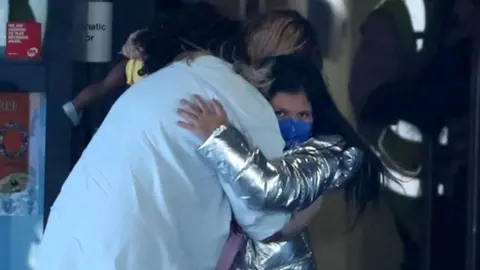 PA Media
PA MediaIn February, with the number of Covid cases soaring, all passengers arriving in Scotland on international flights were told they would have to enter “managed isolation” in a quarantine hotel for 10 days.
Chun Wong and his eight-year-old daughter Kiernan arrived in Scotland after immigration delays kept them apart from wife and mother Danielle for 16 months.
They had arrived in Edinburgh from the US via Dublin and had been told to go to a quarantine hotel.
However, they were later told that as they had got a connecting flight from Ireland, which is within the UK’s Common Travel Area, they could instead isolate at home.

13. Alex Salmond launches new political party
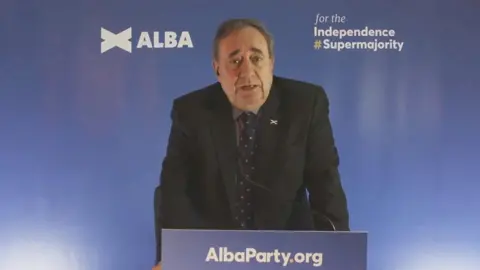
At the end of March, with just over a month to go until the Scottish Parliament election, former first minister Alex Salmond made a big announcement – he was starting a new political party.
It came at the end of a dramatic week at Holyrood in which First Minister Nicola Sturgeon was cleared of breaching the ministerial code over her involvement in the saga surrounding the botched handling of harassment complaints against Mr Salmond.
Mr Salmond, the former leader of the SNP, created a new pro-independence party – Alba – with the aim of building “a supermajority for independence” at Holyrood.
Other parties described Mr Salmond as “discredited” and questioned his suitability for public office.
In May’s election the party did not pick up any seats.

14. Greta Thunberg
 Reuters
ReutersIn November, the eyes of the world were on Glasgow for the United Nations Climate Change Summit, Cop26.
Swedish activist Greta Thunberg told a mass rally in the city that the summit had been a “failure”.
She joined thousands of young people – including striking school pupils – for a march through the city.
Then she addressed the crowd when it arrived in George Square, saying “immediate and drastic” cuts to emissions were needed.

15. Snow drifts
 Jasperimage
JasperimageIn February, cars on a main road in Moray were buried under huge banks of drifting snow.
The snow was mud-coloured because it was blown off fields by gale-force winds.
Snow ploughs were used to try to clear the stretch of the road but were unable to make it through.

16. Zero visibility
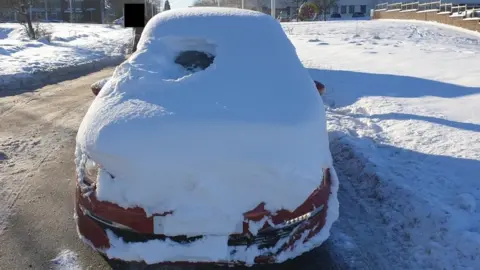 Police Scotland
Police ScotlandAlso in February, a man was charged with dangerous driving after being stopped in Dundee with snow covering almost his entire front and rear windscreens.
Police said it was “about the most extreme example of lack of preparation” that they had ever seen.
Officers said the man had been driving with “practically zero-visibility” when stopped.

17. Cruise ship not allowed to dock
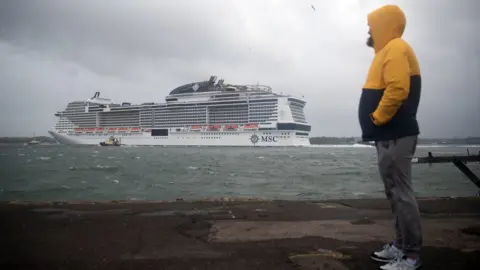 PA Media
PA MediaIn June, as Covid restrictions were easing, the MSC Virtuosa left Liverpool for a seven-night UK cruise, with planned stops in Greenock, Belfast, Southampton and the Isle of Portland.
However, passengers were told that Scottish government Covid rules blocked it from entering the port of Greenock.
The government said domestic cruises could only restart when restrictions in all of Scotland went down to level one.
It insisted the decision was based on the risks “between both cruises and the wider travel context”.
The industry body said the situation meant Scots on board the vessel were effectively “barred from setting foot in their own country”.

18. Immigration van
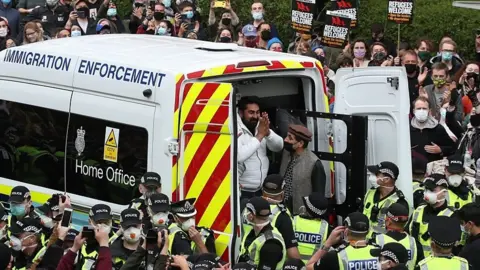 PA
PAIn May, the Home Office removed two men from a flat in the southside of Glasgow over “suspected immigration offences”.
In response, hundreds gathered in the area and one man crawled under the immigration van to prevent it leaving the area.
Some of the protesters were heard shouting “let our neighbours go”.
The stand-off lasted for almost eight hours before the men were released “to protect public safety”.

19. The snow melts away
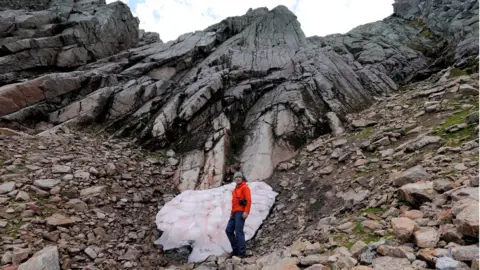 Iain Cameron
Iain CameronIn November, what is historically the UK’s longest lasting patch of snow disappeared for “only the eighth time in 300 years”.
Dubbed the Sphinx, the patch on remote Braeriach in the Cairngorms has melted away more frequently in the last 18 years.
Snow patch expert Iain Cameron said climate change was a likely factor.
According to records, the Sphinx previously melted fully in 1933, 1959, 1996, 2003, 2006, 2017 and 2018.

20. Janey Godley dropped
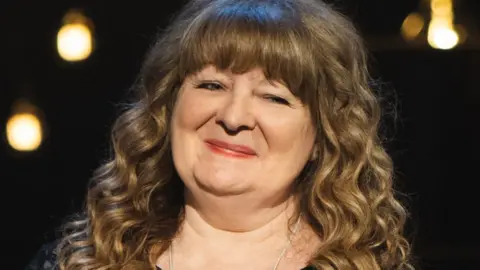 PA Media
PA MediaComedian Janey Godley gained a large online following during lockdown for her viral voice-overs of First Minister Nicola Sturgeon’s daily briefings.
Her success led to her being paid for a Scottish government health campaign to encourage face coverings and lateral flow testing.
In September, some of her previous tweets were published by several newspapers and she admitted they had “terrible, horrific undertones”.
She apologised “without reservation” to “everyone I hurt” and offered to donate the fee for the advert to the STV Children’s Appeal.



